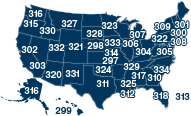Contract Update #14 -- Arbitration Hearings Continue
(November 13, 2012) Hearings in the ongoing interest arbitration proceedings to determine the terms of the 2011 National Agreement between the NPMHU and the Postal Service continued on Friday, November 9, 2012. The hearings are being conducted before a three-person arbitration panel – chaired by Herbert Fishgold as the neutral member, with Robert Dufek serving as the USPS-appointed member and Robert Weinberg serving as the NPMHU-appointed member. The next hearing is scheduled for November 16, 2012, with continuing hearing dates already scheduled through January of next year.
At the hearing on November 9, the Postal Service’s lead advocate set forth the general outlines of the USPS arguments and evidence. The agency’s case starts with the dire financial circumstances facing the Postal Service, which are caused, in the Postal Service’s view, primarily by electronic diversion of first-class mail. This means that the Postal Service is “insolvent,” with more than $36 billion in losses over the past six years. Its liquidity is approaching exhaustion; it has maximized its debt load at $15 billion; and thus, according to the Postal Service, it needs a total restructuring of its labor costs for mail handlers.
What follows from these arguments is a series of draconian proposals from the Postal Service, including – for current mail handlers – absolutely no general wage increases, no cost-of-living adjustments, and a drastic increase in employee contributions for health insurance to the current rate paid by federal employees. Another proposal from the Postal Service seeks to substantially modify, and effectively eliminate, the current no lay-off clause. In addition, the Postal Service is seeking the authority to hire and to utilize, without any contractual restrictions on scheduling, use, or retention, a total of 25% non-career casual employees. Finally, for new career mail handlers hired in the future, the Postal Service proposes that their pay rates be 20% lower at the entry level and 20% lower at the maximum level. The bottom line is that the Postal Service seeks to freeze the wages for all current mail handlers, while reducing their take-home pay by approximately 8% to pay for health insurance premiums. For new hires, the USPS proposal would mean a permanent, non-career workforce with low pay and no benefits for one-quarter of employees performing mail handler work, and a reduction of 20% in the wages of newly hired career mail handlers.
In contrast, the NPMHU is seeking a restoration of general wage increases and cost-of-living adjustments for current mail handlers, which would be part of an overall financial package that would allow the Postal Service to reduce its overall labor costs in future years. NPMHU representatives made clear that the Postal Service is institutionally incapable of either presenting or agreeing to a rational or common-sense approach to labor costs, and thus it would be necessary for the arbitration panel to issue an award that met those requirements.
As noted, hearings reconvene on November 16, with the Postal Service expected to present evidence about its current financial situation. Watch for future updates to learn about developments as they occur.
